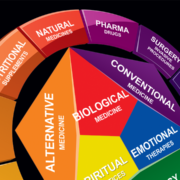How Family Drama May Be Impacting Your Health
The holidays aren’t always all sugar and spice and everything nice. December can often feel like equal parts merry and mayhem. It’s like all of a sudden, the end of the year just comes out of nowhere, and you’re handed a Santa-sized list of things to do—shop, wrap, bake, decorate, entertain, and participate in an assortment of holiday festivities—on top of all of your usual responsibilities. Now, sprinkle in some family drama, and no wonder so many of us are sick, stressed, and void of holiday cheer.
The Unmerry Side of the Holidays
A study conducted by the American Psychological Association found that 38 percent of people reported that their stress level increases during the holidays. Another study found that a quarter of Americans would rather skip the holidays altogether than deal with the stress associated with them. The end of the work year can also present its very own pressures. Not to mention, the holidays can be very expensive, and when expectations are set unrealistically high, a full-on meltdown can take place right in the heart of winter.
While the Hallmark image of the holidays paints this wonderful time of the year filled with family, friends, food, and fun, this is not everyone’s reality. And let’s be honest, is there such a thing as the perfect family where everyone gets along all the time, respects one another, and shares all the same beliefs (political, cultural, social, religious, dietary, etc.)? For some of us, family drama may be deep-rooted, and for many of us, family drama is repetitive, where certain people play distinctive roles year after year. An example of this is illustrated in the Karpman Drama Triangle.
Karpman Drama Triangle
BPDFamily explains that Dr. Stephen Karpman “observed that in conflict and drama, there is a “good guy vs. bad guy” thinking. He also observed that the participants become drawn in, even seduced, by the energy that the drama generates. The drama obscures the real issues. Confusion and upset escalates. Solutions are no longer the focus.” Dr. Karpman defined three roles played out during pathological conflict: the persecutor, the rescuer, and the victim.
Persecutor: acts superior, self-righteous, and authoritative; always right; “It’s all your fault.”
Rescuer: acts as the enabler; “Let me help you.”
Victim: acts victimized, helpless, and unable to solve problems; “Poor me!”
This negative triangulation is formed by participants who have a predisposition to the roles they adopt. This dysfunction perpetuates because each participant “gets some psychological needs met and they feel justified in their role, often not realizing the broader dysfunction and harm that is occurring.” The simplified solution to avoiding or removing yourself from a drama triangle is to stop playing the role of persecutor, rescuer, or victim.

How Family Drama May Be Impacting Your Health
Family drama may be impacting your health far more than you realize. Whether you are stuck in a drama triangle or are just witness to one, the angst, anxiety, anger, and aggravation associated with family drama can be detrimental to your immediate and long-term wellbeing. A study published in the Journal of Family Psychology found that “greater family strain was associated with a great number of chronic health conditions.” Even the anticipation of drama or conflict can cause adverse physical and emotional reactions in advance to the actual family gathering.
How Family Drama Can Lead to Stress
Stress is a potent poison. Holiday stress can cause fatigue, irritability, headaches, digestive issues, increase or decrease in appetite, muscle and joint pain, difficulty focusing, and insomnia. Family drama and stress go together like milk and Christmas cookies. Depending on your specific family drama history, your stress response to this family-heavy season might be hardwired as you’ve been conditioned over the years. Take this scenario, for example.
One of your earliest sensory memories of Christmas at your grandmother’s house is the smell of fresh-out-of-the-oven gingerbread cookies. While this scent memory is pleasant, Christmas at your grandmother’s house also always included a lot of arguing between extended family members. Now, during the holiday season, whenever you smell gingerbread cookies, your body produces a stress response because, over the years, the association between gingerbread cookies and fighting has been neuropathologically created. So, even if you get to enjoy a Christmas dinner without any family drama, you might still experience stress.
Aside from the stress from past learned experiences, current and ongoing family drama undeniably creates an atmosphere of tension. We have these expectations that our families should always be supportive, respectful, like-minded or open-minded, sensitive, and empathetic. As we all know, this is not always the case, and with some family members, it is never the case. And now, more than ever, it seems like the plague of polarization has infiltrated the family unit, too, creating even more room for family drama.
Setting realistic expectations of specific family members and acknowledging conflict patterns can help you mitigate the stress associated with family. And remember, the holidays only come once a year!
The Health Effects of Stress on the Immune System
The relatively new field of psychoneuroimmunology (PNI) focuses on identifying the interactions between behavioral, neuroendocrine, and immunological adaptation processes. PNI studies the mind-body connection. This is relevant because there is a direct connection between emotional states, such as stress and immunity.
When we are stressed, especially chronically stressed, our immune system’s ability to fight off pathogens is reduced, making us more prone to getting sick. According to the World Health Organization, the link between negative psychological states and the immune system involves a decrease in lymphocyte proliferation and natural killer cell activity, as well as changes in the number of white blood cells and the number of antibodies circulating in the blood.
Another way stress impacts our immune system relates to how we cope with stress. Common stress coping behaviors include drinking alcohol, smoking cigarettes, using illicit substances, and making poor diet choices. Stress can also lead to disruptive sleep patterns. These behaviors can compromise your immune system too.
How to Break Free from Negative Feedback Loops
Resolving conflict and eliminating family drama isn’t easy. Between past learned conditioning and drama triangles, sometimes it takes a whole new approach to break negative feedback loops. The following five therapies and techniques might help you gain some new perspectives, acquire some useful tools for dealing with family drama, and help you heal from emotional stress and trauma.
Neuro Emotional Technique (NET)
Neuro Emotional Technique is a psycho-emotional therapy based on the physiological foundations of stress-related responses. The body holds onto emotions that have been experienced from the beginning of one’s life through to the present. Negative or traumatic emotions from the past can be triggered and resurface, returning the individual to the state of the original trauma or adverse event. As we know, negative emotions can lead to disease. The goal of NET is to correct the imprinted emotional information affecting physiological function.
Some of the benefits of NET include correcting neurological imbalances related to unresolved stress and promoting more fulfilling relationships with family and friends.
Family Constellation Therapy
Family Constellation Therapy works to shift generations of suffering and unhappiness by revealing hidden dynamics in relationships to identify stressors that negatively impact them. The goal of this therapy is to help a patient break toxic patterns. The benefits of this practice include revealing hidden cross-generational patterns that affect our lives through unconscious loyalty to our family, helping to find the right place within our family, empowering and strengthening our ability to respond to challenges, and freeing us from analyzing the past.
Eye Movement Desensitization and Reprocessing Therapy (EMDR)
EMDR therapy is recognized as an effective form of trauma treatment. EMDR helps patients who suffer from disturbing memories, anxiety, PTSD, panic, and other emotional problems. It works by helping to free the patient from destructive thinking and limiting beliefs, restore a more positive outlook, and overcome emotional difficulties and life challenges. Various procedures and protocols are used to address a wide range of pathologies during the treatment.
Emotional Freedom Technique (EFT)
Emotional Freedom Technique is a simple psycho-emotional therapy and form of psychological acupuncture. Instead of needles, a tapping technique is employed using your fingers on specific meridians on the head, chest, and arms while voicing positive affirmations. This combination works to clear emotional blocks that contribute to poor cellular function and the disruption of energetic pathways. EFT can be used to clear our old traumas and welcome new challenges with a positive and healthy attitude. Once learned, EFT can be practiced anytime and anywhere—perfect for upcoming family gatherings.
Ho’oponopono
Ho’oponopono is an ancient Hawaiian self-transformation technique for healing, reconciliation, and forgiveness. The process of Ho’oponopono is to align with and clean up our genealogy and clean up our relationships with other people in our lives. The benefits include helping to achieve balance, relieve stress, recover from anger and distress caused by negative experiences, remove past negative emotional ties, and enhance confidence and clarity.
The practice consists of four phases: “I am sorry,” “Please forgive me,” “I love you,” and “Thank you.” The phases are used and repeated while holding on to a negative thought, emotion, or experience. By doing this, negative cycles detrimental to health are broken and erased.

Let’s Have a Healthy and Happy Holiday Season
As the old adage reminds us, you can pick your friends, but you can’t pick your family. You can, however, choose to learn how to calm old stress responses, alleviate trapped emotions, break away from any drama triangles you might be in, and eliminate or lessen additional pressures that contribute to a high-stress holiday season. Because, let’s not forget, it’s supposed to be the most wonderful time of the year.
Disclaimer: The statements made in this article have not been evaluated by the Food and Drug Administration. Any products or treatments mentioned are not intended to diagnose, treat, cure, or prevent any disease. Please consult a licensed medical practitioner for medical advice.
At Innovative Medicine, we believe in transparency. We want you to know that we may participate in affiliate advertising programs pertaining to products mentioned herein.
See how we can help you restore complete health of body, mind & spirit.
Join our mailing list and receive exclusive offers + information!







Leave a Reply
Want to join the discussion?Feel free to contribute!